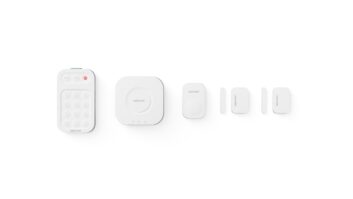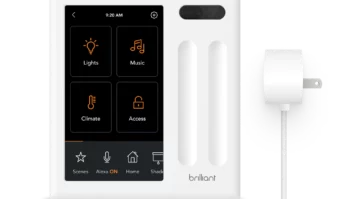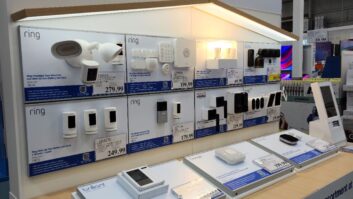SONICblue continues to expand its selection of Rio-branded home and portable compressed-audio products.
In recent weeks, the company began shipping its first hard-drive headphone portable and its first shelf system, an executive-style microsystem with MP3-CD playback. The company also began shipping its first under-$99 MP3-CD headphone portable, expanding its selection of compressed-audio CD portables to five.
In May, the company will expand its selection of flash-memory portables with the shipment of the Rio 900 with 192MB of embedded memory and an optional 64MB add-on. The 900, targeted to retail for an everyday $249, is intended to be “a bridge from our current products to products we’re going to” in the third and fourth quarters, said audio products VP David Huffman. That’s when the company will “completely revamp” its selection of flash-memory and compressed-audio CD portables.
It’s too early to say if SONICblue will expand its home audio selection in the fourth quarter, he noted.
Although expanding its SONICblue-brand selection in home and portable audio, the company is leaving other markets. The company has decided to sell off its existing inventory of in-dash autosound hard drives, available mainly through the company’s Web site. “We will use more of a licensing approach versus manufacturing and selling,” Huffman said. said. “Our strength is in CE and PC retailers.” Auto maker and 12-volt aftermarket channels “are not our strength right now,” Huffman added.
As for the company’s California Audio Labs (CAL) brand, SONICblue continues to sell CAL products but is also “continuing to evaluate how CAL fits in,” a spokesman said. No decisions have been made.
In another change, SONICBlue is parting ways with Nike, having manufactured Nike-brand portable audio products that were marketed by Nike (see p. 3).
Although SONICblue posted a net loss of $44.1 million in the fourth quarter of 2001, the company expects to return to profitability in the third quarter of this year. The company said its fourth quarter loss was lower than its third quarter $55.3 million loss, that revenues grew 45 percent to $79.6 million over the previous quarter, and that gross margins in fourth quarter rose 3 percentage points to 18 percent.
Here’s what SONICblue is doing in its Rio-branded portable-audio segments:
Flash-memory portables: Aggressive summer and back-to-school launches of next-generation flash-memory portables are in the works. These products, said Huffman, will boast 200-percent to 300-percent longer battery lives. Current models yield 10-12 hours on a single AA alkaline or rechargeable NiMH.
In addition, the new models will “probably” offer memory-card upgrades in industry-standard formats rather than in its proprietary Back Pack configuration because the pricing and availability of standard memory cards has improved since the launch of current Rio products. Back Packs combine flash memory and rechargeable battery in one add-on module.
SONICblue expects to continue offering solid-state portables that decode MP3 and Windows Media Audio (WMA) files, including WMA files wrapped in WMA’s DRM. Other codecs “don’t have a lot of traction,” said Huffman. WMA and ATRAC3 are supported by the Universal/Sony-owned Pressplay service.
Before it ships its revamped product line, SONICblue plans May shipments of the Rio 900. It will join a 128MB model at an everyday $199 and a limited-distribution 384MB model at around $400, he said.
Although manufacturers and retailers said they encountered slower solid-state growth than they expected, Huffman said he’s bullish. “As part of a total product strategy, it has an important part,” Huffman said. “It’s the most portable. And for active users, it doesn’t skip.”
Nonetheless, he said, 2002 will be the year when MP3 CD portables surpass solid-state counterparts in units and dollars.
Compressed-audio CD portables: These products, Huffman said, are “hot.” He projects industrywide growth of about 50 percent in units in 2002. To participate in that growth, the company just expanded its RioVolt line of compressed-audio CD portables with the shipment of the $69.99-everyday SP50, its first at less than $99. It plays MP3 files, while models starting at $99 play MP3 and WMA.
During the second half, a revamped line will include models with new cosmetics and some targeted to “very active users,” Huffman said. For now, he said, the launch won’t include 3-inch CD portables. “Retailers are not too enthusiastic about the current 3-inch CD,” Huffman claimed. “You can’t play standard [5-inch] CDs, and the prices are high, starting at around $150.”
The company’s first CD portable shipped a year ago.
Hard-drive portables: The company’s first model, the 20GB Rio Riot, just became available on the company’s Web site, and it goes to retailers during the first week of April. More models are due at unannounced dates with different size hard drives, styling and consumer targets. “We’re gearing up for a huge effort,” Huffman said.
At an everyday $399, it features large LCD screen, FM tuner, and Replay-like technology that plays the user’s most-listened-to songs at the press of a button. It also lets users listen only to songs that were most recently ripped or to songs that haven’t been played back in a while, Huffman said. Those modes come on top of the standard sorting by artist, title and genre.
Sales of hard-drive portables are growing rapidly because, as with the Riot, music from up to 400 CDs can be stored in a single device, making it unnecessary to carry around lots of CDs. Although hard drives won’t outsell flash-memory portables in units in the next several years, hard drives might outsell flash in dollars because of their higher prices, Huffman noted.
For now, SONICblue has no plans for a portable player/ripper in either hard-drive or solid-state forms, Huffman said, because of cost, size, battery drain and the difficulty of naming files without a connected PC. PCs can download file names automatically from the Web, and PC keyboards can be used to add names not on the Web.













